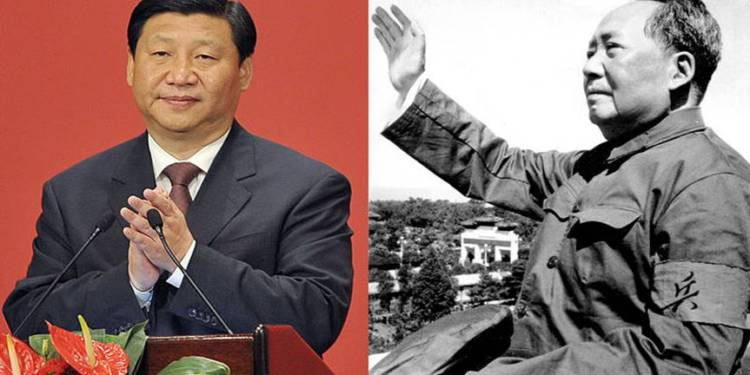While Xi Jinping continues to have a laugh at the expense of the world, China is all set to face a massive food shortage due to the fragile supply chains across the globe in the wake of the pandemic. China is the top consumer and the highest importer of food and is set to suffer the consequences of creating a pandemic.
Mao Zedong has many admirers in the Chinese Communist Party with Xi Jinping being one of the ardent followers of the radical leftist ideologue. When Xi Jinping sought to follow the footsteps of Mao, little did anyone know that Jinping would take it so literally. Mao Zedong presided over the Great Famine which killed millions in China after which the then Chinese government broadened wildlife trade for meat sold at wet markets which eventually resulted in the SARS outbreak in 2002.
While Xi Jinping continues to focus all the government’s resources on pushing Chinese propaganda on coronavirus and seeks to pin the blame on the USA, back home Xi Jinping is staring at a severe food crisis.
The pandemic has disrupted the already fragile food supply chain and production with countries across the globe restricting exports to meet the local demand. The three global agencies — the United Nations Food and Agriculture Organisation, the World Health Organisation and the World Trade Organisation out of which one is headed by a Chinese diplomat and the other being a lackey of Xi Jinping, have warned of an impending food crisis if the governments don’t mitigate the challenge.
As countries across the globe are under some form of lockdown, it is increasingly difficult to produce food and even harder to export food to other nations China. Countries are battling a severe shortfall in labour as the lockdown has seen the migrant labours leaving for their respective hometowns. France recently called on its own citizens to help meet the 200,000 shortfall in workers.
China’s farmers heavily rely on the supply of fertiliser and soybeans for their plant production and feeding livestock but with borders sealed, imports have been limited and in such conditions, the country’s farmers are struggling to carry out agricultural activities.
Much to the concern of China, the world’s third-largest rice exporter, Vietnam, has planned to stockpile grain. Additionally, Thailand has also banned shipments of chicken eggs to the world as it scrambles to prevent a food shortage.
A recent meet of the Chinese Communist Party to address the food security concern became the source of a leaked document. The document stated that, “The State Party Committee and the state governments and counties and cities must do everything possible to transfer and store all kinds of living materials such as grain, beef, mutton, oil and salt through various channels.”
Leaked #CCP official notification from Linxia Prefecture in #Guansu Province in #China issued on Mar 28. Main points: Enhance awareness of the urgency and crisis state of food shortage. Guide and motivate the mass to ensure each family maintains food storage for 3-6 months. pic.twitter.com/GLpGyeBvu4
— Inconvenient Truths by Jennifer Zeng 曾錚真言 (@jenniferzeng97) April 1, 2020
Such is the situation in China that the document called for the “mobilization of the masses to consciously store grain and ensure that each household reserves between 3 and 6 months of grain for emergencies.”
In February, a spokesperson of the Chinese Commerce Ministry admitted that the country’s food and agriculture industries would be “heavily impacted” if the coronavirus continued to wreak havoc.
Panic buying and locus attacks in Africa, Middle East and Pakistan have further exacerbated the food-supply crisis. The United Nations has already warned that a second wave of attack of the insects could threaten the food security of 25 million people across Africa and the Middle East.
Even before the pandemic, China was battling a food crisis which was of its own making. Its failure to contain the African Swine Fever last year saw the food prices in February jump by 21.4 per cent which was largely owed to a 135.2 per cent hike in pork prices. Instead of addressing the African Swine Fever which halved China’s pig herd, the Chinese government was focusing on getting the leadership of the United Nations Food and Agriculture Organisation, which it was ironically successfully able to do so.
Compared to last year, consumer prices rose a record 5.4 per cent in January and 5.2 per cent in February. Worryingly, China relies on exports for close to 80 per cent of its consumed soybeans items such as milk and sugar. The pandemic has again brought to light about China’s affinity for meat consumption and soybeans being used for animal feed are likely to be in short supply. The country is now consuming a whopping 50kg of meat per capita as its meat consumption rose to 75 million tonnes in 2017. The steep rise in meat consumption has resulted in China exponentially increasing its soybean imports which touched 95 million tonnes in 2017.
The Coronavirus pandemic will pose a formidable challenge to the Chinese government as they battle a rising food demand with limited domestic supply and little imports thanks to the skewed supply chain. Will Xi Jinping follow his idol Mao Zedong’s footsteps and plunge the country into famine or for once in his tenure, will he actually stand up for the Chinese people remains to be seen.























